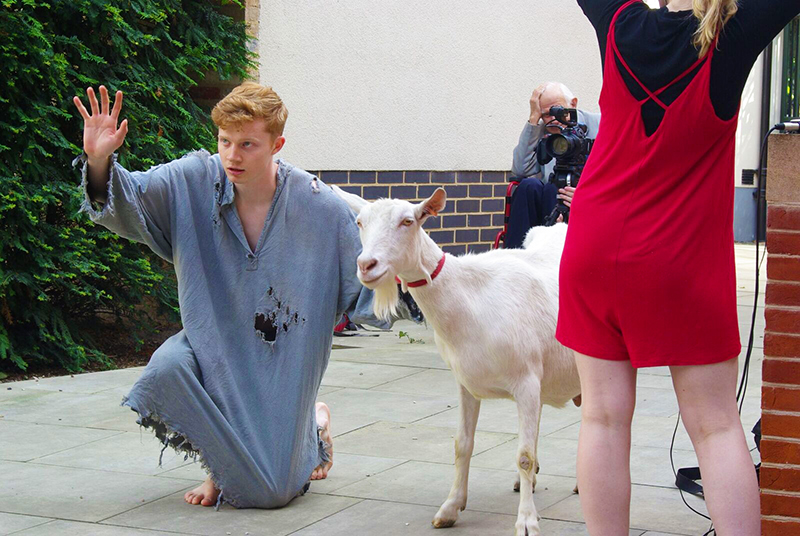The Poor Man of Nippur is a 160-line Babylonian story about a pauper called Gimil-Ninurta who is cheated by city’s mayor out of his only possession – a goat – so he vows to avenge his mistreatment ‘three times over’.
The compelling folk tale was found etched on a clay tablet at the archaeological site of Sultantepe, in South-East Turkey. It dates to 701 BC, though the story is probably much older. There is also a fragment of the story from the library of the Assyrian king Ashurbanipal.

George Heath-Whyte as Gimil-Ninurta in The Poor Man of Nippur with Florence the goat. Photo credit: Department of Archaeology, University of Cambridge
Dr Worthington, senior lecturer in Assyriology and Fellow of St John's College said: “As a story of three-fold revenge, The Poor Man of Nippur is one people today can easily relate to. Though it has the plot of a folk tale, it is written in high poetic style. The only character with a name is the hero called Gimil-Ninurta. His name means ‘revenge of the God Ninurta’, Ninurta being a god of Nippur. This fits the plot perfectly.”
Nippur was a city in the north of Babylonia, a region in central-southern Mesopotamia, present-day Iraq. The area is often described as the ‘cradle of civilisation’ and the culture is considered to be very close to the culture of the Old Testament - the story of Noah and the Ark has been found in Babylonian language. The first writings in Babylonian date back to about 2000 BC.
Dr Worthington added: “Babylonia has such a rich history and there are tens of thousands of documents from the time of The Poor Man of Nippur. We have letters from spies, stories of families who became the equivalent of billionaires, details of religious reforms, medical prescriptions, and surgical instructions.
“The range of information that is accessible to us is something most people don’t suspect, so part of this film project is to open up this fascinating world to more people.”
Dr Martin Worthington is an Assyriologist who specialises in Babylonian, Assyrian and Sumerian grammar, literature and medicine. He directed the film, co-produced with Dr Kathryn Stevens of Durham University, which will have its international premiere at St John’s College tonight (Tuesday, November 27 2018).
Dr Worthington added: “It is a very funny tale but also rather violent – there are three beatings as Gimil-Ninurta exacts his revenge. The story is set in an unspecified time in the past, and it is unusual by the standards of Mesopotamian narratives because there are no gods.
“Most of the stories we have from Babylonia are about gods, probably because most of the written literature we have is associated with institutional settings like temples. Stories like The Poor Man of Nippur doubtless circulated orally, but they weren’t usually written down.”
The film was acted by Assyriology students and other members of the Mesopotamian community at the University of Cambridge. Shooting locations were in several Cambridge Colleges including St John’s College, King’s College, Peterhouse, and Trinity College; also in The British Museum, Flag Fen Archaeology Park, and countryside near Grantchester.
Telling a story in a language that has not been spoken for 2,000 years was not without its challenges.
Dr Worthington said: “The students are following how they have been taught to pronounce Babylonian, which is a mix of educated guesswork and careful reconstruction. Reconstructing the sounds of a dead language is to some extent a dark art, but we are fortunate with Babylonian that we have transcriptions into the Greek alphabet, and these confirm in outline what the language sounded like. Also, Babylonian is closely related to Arabic and Hebrew – which helps, because the sounds of Semitic languages tend to be a lot more stable than those of Indo-European ones.”
The film project began after students suggested it would bring the poem to life. Dr Worthington hopes the film will invite people to ‘reconsider their ideas about the ancient world’.
He said: “One reason for making the film was to experiment with a new form of interpretation for Babylonian literature – acting out the story made us think in a new way about the characters and who we are supposed to be rooting for.”
The film was funded by The Philological Society, The Thriplow Charitable Trust, The Judith Wilson Fund, The CHW Johns Fund for Assyriology, St John's College, Trinity College, The Henry Sweet Society for the History of Linguistic Ideas, and The London Centre for the Ancient Near East.
The film is in the original language, but there are subtitles in many modern languages, including: Arabic, Catalan, Czech, Dutch, English, French, German, Greek, Japanese, Kurdish, Portuguese, Russian, Spanish, Turkish and other languages.
People at home can find out more about The Poor Man of Nippur in Dr Worthington’s book Teach Yourself Complete Babylonian.